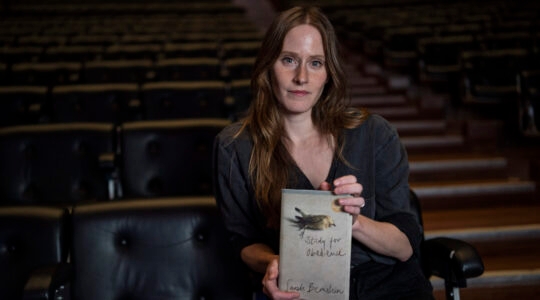Rabbi Eric Yoffie, president of the Union for Reform Judaism, the largest synagogue movement in the county, is calling on Israel to enact a construction freeze in parts of Jerusalem.
He issued the call during remarks to rabbis and members of URJ’s board of trustees on Thursday:
The Union for Reform Judaism, like most American Jewish organizations, supports a united Jerusalem under Israeli sovereignty. This means that we believe housing units constructed in Jerusalem by Israel are not settlements and they are not illegal. But a great many things that are legal are not prudent or wise – and building in Arab sections of Jerusalem in the current political climate is one of those things.
This decision to build in eastern Jerusalem is one that is not supported by any Israeli ally, including the United States and Canada. I see no reason why Israel should renounce her claim to all of Jerusalem as Israel’s eternal capital, or her right to build anywhere within Jerusalem’s borders. But there are many reasons why Israel should consider a temporary moratorium on all such building. Such a step would strengthen relations with the United States at a moment when those relations have been frayed; it would be greeted enthusiastically by other strong and loyal allies, such as Canada, that were angered by Israel’s recent action; it would demonstrate a firm commitment on Israel’s part to the American-sponsored peace negotiations; and it would, potentially, breathe life into those negotiations and turn the attention back to where it is most needed — moving forward to a lasting, meaningful peace. Nothing should divert us from this goal.
Here’s the text of the full text of his remarks:[[READMORE]]
Good afternoon. This has been a difficult and complicated time for us as American Jews. We have a number of mandates at the moment: We proclaim our love for Israel in unmistakable terms, and we work to prevent the current situation from spiraling out of control and causing a deep rift between Israel and the United States.
The words of Vice President Biden last week at Tel Aviv University were heartening to all lovers of Israel. The Vice President expressed, in unequivocal language, the commitment of the American administration to Israel’s security and well-being. “There is absolutely no space,” he said, “between the United States and Israel when it comes to security — none.”
The general approach of the Reform movement to issues of peace is the same as that of all recent American administrations: We remain committed to an Israel that is Jewish and democratic, we affirm our commitment to a two-state solution, and we support an active American role in the peace process.
Current tensions are not about a two-state solution, which is accepted by Israel. Nor are they simply about diplomatic courtesy. There is also a substantive question of great importance that needs to be addressed: Should Israel continue to build now in East Jerusalem? I believe that it should not.
The announcement by the Jerusalem District Planning Committee of its intention to construct 1,600 new housing units in East Jerusalem was a serious miscalculation, leading to condemnation of the decision by Vice President Biden and Secretary of State Clinton. Most American Jews join with our government and others in the Jewish community in noting that this announcement by Israel was an error, particularly disturbing at a time when progress on peace talks appears to be possible. Prime Minister Netanyahu is to be applauded for his prompt expression of regret over the timing of the announcement.
We recognize that compromise will be necessary to reach a solution and achieve a final peace agreement. We expect that the three major settlement blocks will remain a part of Israel and naturally expect that, under a final status agreement, Palestinians fully accept the state of Israel and her right to exist.
Jerusalem, however, poses different issues. The Union for Reform Judaism, like most American Jewish organizations, supports a united Jerusalem under Israeli sovereignty. This means that we believe housing units constructed in Jerusalem by Israel are not settlements and they are not illegal. But a great many things that are legal are not prudent or wise – and building in Arab sections of Jerusalem in the current political climate is one of those things.
This decision to build in eastern Jerusalem is one that is not supported by any Israeli ally, including the United States and Canada. I see no reason why Israel should renounce her claim to all of Jerusalem as Israel’s eternal capital, or her right to build anywhere within Jerusalem’s borders. But there are many reasons why Israel should consider a temporary moratorium on all such building. Such a step would strengthen relations with the United States at a moment when those relations have been frayed; it would be greeted enthusiastically by other strong and loyal allies, such as Canada, that were angered by Israel’s recent action; it would demonstrate a firm commitment on Israel’s part to the American-sponsored peace negotiations; and it would, potentially, breathe life into those negotiations and turn the attention back to where it is most needed — moving forward to a lasting, meaningful peace. Nothing should divert us from this goal.
If a peace agreement becomes a real, viable possibility, Israel will likely be prepared and willing to compromise in a fundamental way on Jerusalem. We saw this a decade ago when Israelis, under Prime Minister Ehud Barak, faced the very real possibility of peace in the near future and were willing to make far-reaching concessions. If peace were truly to become possible, we would expect this to happen again — but first, peace talks must begin.
We do not know if the talks that are soon to begin will generate positive momentum toward peace, but the governments of the United States and Israel have expressed hope that they will. Surely no opportunity to move toward an enduring settlement must be squandered. I hope that the government of Israel will see the declaration of a temporary moratorium on building in East Jerusalem as a means of seizing the initiative, deepening her ties with America, rallying her allies around the world, and challenging the Palestinians and Arab world to come forward with confidence-building steps of their own.

Help ensure Jewish news remains accessible to all. Your donation to the Jewish Telegraphic Agency powers the trusted journalism that has connected Jewish communities worldwide for more than 100 years. With your help, JTA can continue to deliver vital news and insights. Donate today.





